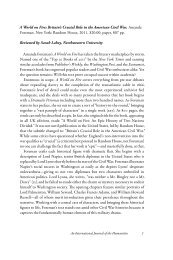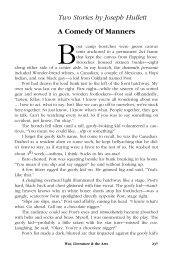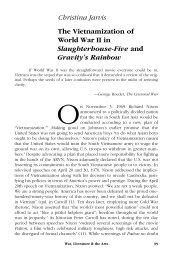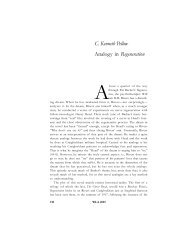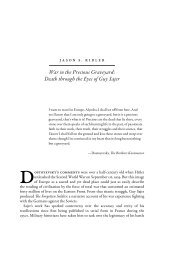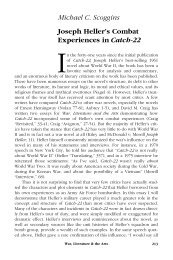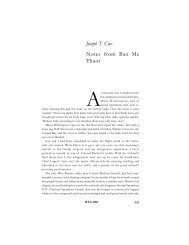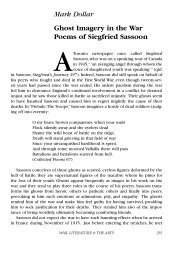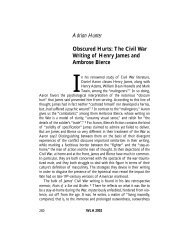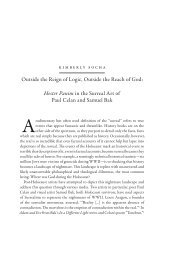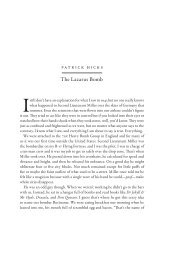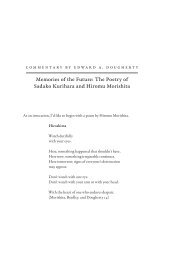Conrad's “The Secret Sharer”: A Private Ethics of Leadership
Conrad's “The Secret Sharer”: A Private Ethics of Leadership
Conrad's “The Secret Sharer”: A Private Ethics of Leadership
You also want an ePaper? Increase the reach of your titles
YUMPU automatically turns print PDFs into web optimized ePapers that Google loves.
the conclusion that he cannot be judged by the “twelve respectable tradesmen” who<br />
as an English jury represent the law and the interests <strong>of</strong> society. Leggatt actually<br />
denies that the system can judge him, and this impresses the narrator who had<br />
judgment by others so much on his mind before the secret sharer came aboard. And<br />
Leggatt’s chosen alienation is a remarkable, modernist, extreme existential gesture:<br />
to declare oneself free <strong>of</strong> social context. Billy Budd couldn’t do it and Captain<br />
Vere did not help him. Unlike Billy, Leggatt does not bless his captain. In effect he<br />
becomes a unique system unto himself, wandering the face <strong>of</strong> the earth, and in the<br />
process he embodies a critique <strong>of</strong> the home system, the traditional system <strong>of</strong> legal<br />
precedent and <strong>of</strong> hierarchical command.<br />
The home system is represented in its blind inertia by Captain Archbold<br />
<strong>of</strong> the Sephora. He comes on board the narrator’s vessel seeking the escaped Leggatt.<br />
He serves as the representative <strong>of</strong> established law and order, the conventional<br />
system <strong>of</strong> justice that Leggatt has rejected. Captain Archbold’s chief characteristic<br />
is a “spiritless tenacity,” suitable for the embodiment <strong>of</strong> unimaginative process and<br />
procedure, <strong>of</strong> the single point <strong>of</strong> view. The narrator determines that Archbold has<br />
made up his mind not to credit Leggatt for setting the reefed foresail. He claims to<br />
have given the order himself and then dutifully passes the credit on to Providence.<br />
“God’s own hand in it,” he asserts. The narrator asks:<br />
“You were very anxious to give up your mate to the shore people, I believe?”<br />
He was. To the law. His obscure tenacity on that point had in it<br />
something incomprehensible and a little awful: something, as it were,<br />
mystical, quite apart from his anxiety that he should not be suspected <strong>of</strong><br />
“countenancing any doings <strong>of</strong> that sort.” Seven-and-thirty virtuous years at<br />
sea, <strong>of</strong> which over twenty <strong>of</strong> immaculate command, and the last fifteen in<br />
the Sephora, seemed to have laid him under some pitiless obligation. (27)<br />
In his absolute devotion to the prescribed law and in his inability to perceive ethical<br />
alternatives, his lack <strong>of</strong> a metasystem, Archbold represents a kind <strong>of</strong> degenerate<br />
Captain Vere, stripped <strong>of</strong> the intelligence, passion, and elegance <strong>of</strong> Melville’s leader.<br />
But Leggatt, as we have seen, is no Billy Budd.<br />
It is this Archbold version <strong>of</strong> justice, mechanical and spiritless, that Leggatt<br />
rejects and that he leads the narrator to circumvent. This is no easy matter, involving<br />
as it does a kind <strong>of</strong> existential departure–a departure not just from conventional<br />
legal structure but from the cosmic or religious validation that backs it:<br />
x War, Literature & the Arts



